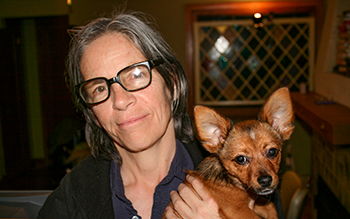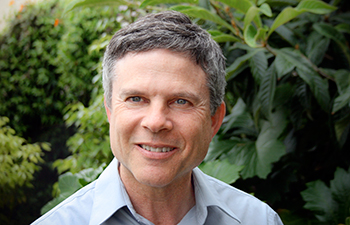By:
- Inga Kiderra
Published Date
By:
- Inga Kiderra
Share This:
Economist, Writer-performer Awarded Guggenheim Fellowships

Eileen Myles
Two members of the UC San Diego faculty have won a Guggenheim Fellowship for 2012: Writer-performer Eileen Myles and economist James E. Rauch.
Myles and Rauch join four others from the University of California, among 181 scholars, artists and scientists from the U.S. and Canada, who have been named Guggenheim fellows in the 88th annual competition. They were chosen from a group of almost 3,000 applicants. Awarded by the John Simon Guggenheim Memorial Foundation and often characterized as “midcareer” awards, the prestigious fellowships support those who have already demonstrated “exceptional capacity.”
Myles, professor emeritus of writing in the department of literature, was selected for her book in progress called “Afterglow.”
A poet who also writes and performs a number of other genres, Myles has been called by Holland Cotter of the New York Times “a cult figure to a generation of post-punk female writer-performers.” She first went to New York in 1974 to be a poet and now lives there again. Myles published her first book of poetry, “Not Me,” in 1991. In 1992, Myles, as she puts it on her website, “first became known to many people for her openly female write-in campaign for President of the United States.”
“The Importance of Being Iceland,” the first full volume of Myles’ essays and art writing, came out in 2009 from Semiotext(e)/the MIT Press. In 2010, she won the Shelley Prize from The Poetry Society of America and published “Inferno: A Poet's Novel,” winner of the 2011 Lambda Literary Award.

James E. Rauch
The book in progress, “Afterglow,” Myles says, “is about the death, dying and after-glow of a remarkable pit-bull, Rosie, who I found on the street. The book traces real and imagined strands of memory. It will engage and unify some themes that have animated my writing since the beginning: otherness, fantasy and a spiritual search.”
The real strands include the “real and sorry situation of caring for my dying dog in a suburban house in Southern California” and the imaginary, receiving “a letter from someone purporting to be Rosie’s lawyer, who explains that my dog has been left some money and is now suing me.”
Rauch, professor of economics in the department of economics – whose primary research areas are development and international economics – is the author of numerous articles and editor or co-editor of three scholarly books: “Missing Links: Formation and Decay of Economic Networks,” “Leading Issues in Economic Development” and “Networks and Markets.”
He was selected for a project on jadedness and professionalism in non-governmental organizations, or NGOs. According to the World Bank, Rauch points out, “NGOs are increasingly seen as complements of, if not replacements for, local and central governments in services that depend on strong community knowledge, flexibility, and personal commitment.”
Rauch plans to “investigate whether NGOs become jaded with time, so that their advantages over government diminish.”
“An NGO may become jaded,” he says, “because it is unable to replace its founding staff with people who are equally well matched to the mission of the organization, or because its directors become more concerned with the survival of the organization or with their own perks than with carrying out the organization's mission.”
If the evidence for jadedness is convincing, Rauch says, “I will also measure the extent to which NGOs respond by shifting to a more bureaucratic (and expensive) mode of operation by hiring more professionals, thereby becoming more like the governments they are supposed to complement or replace.”
Share This:
You May Also Like
Stay in the Know
Keep up with all the latest from UC San Diego. Subscribe to the newsletter today.



